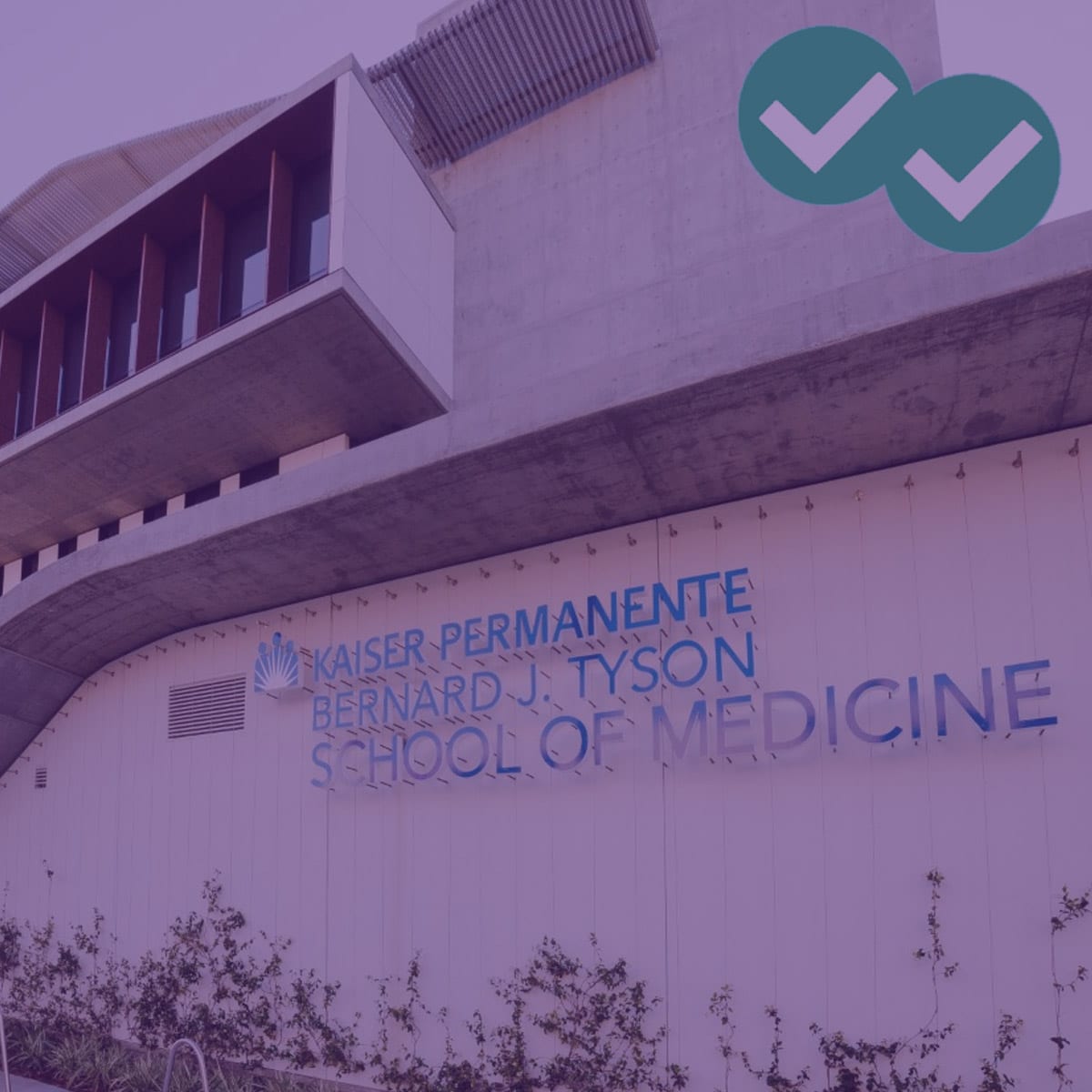
Medical school applications can seem impossibly complicated, and most future med students, at one time or another, ask themselves the simple question, “Exactly how do I get into medical school?” The answer depends on a variety of factors, from whether you’re a traditional applicant (applying soon out of college with a great GPA and MCAT scores) or a nontraditional applicant (transitioning from another career and/or lacking qualities of traditional applicants).
In other words, the answer to our intentionally proactive question in the title is no. There really is no silver bullet or special “secret” that will magically help you get into med school. BUT…there are some easily-forgotten tips that every prospective medical school applicant should know in order to build a foundation for a successful medical school application. Read on to learn these tips, hear directly from current medical students and doctors (search for “interview alert” to check out their amazing stories and advice), and get targeted advice depending on where you may be on your medical school application journey.
Whether you’re a traditional applicant, a nontraditional applicant, a prospective applicant concerned about their candidacy, or even a high school student, rest assured that you’ll leave this post with a solid game plan that will help you get into medical school!
Table of Contents
- Four Tips Everyone Needs to Increase their Med School Odds
- How to Get Into Medical School as a Traditional Medical School Applicant
- How to Get into Medical School as a Non-Traditional Medical School Applicant
- How to Get Into Medical School as a High School Student
- What to Do if You’re Rejected from Medical School
- How to Get into Medical School: A Summary
Four Tips Everyone Needs to Increase their Med School Odds
Getting into medical school is challenging—there’s just no way around it. People who want to study medicine are typically driven, high achievers (like you!). This means that they usually have very high GPAs, Medical College Admission Test (MCAT) scores, and a host of other achievements, making for a super competitive applicant pool.
Additionally, recent statistics from the Association of American Medical Colleges show around a 25 percent increase in medical school applicants over the last ten years. As a result of this increased number of interested students, med schools are reporting all-time low acceptance rates. For example, John Hopkins accepts 5.3% of applicants, Harvard accepts 3.7% of applicants, and Stanford accepts only 2.3% of applicants. Steep med school tuition can be a barrier to many students as well.
That said, hope it definitely not lost! Med schools accept a variety of students every year, and many admissions panels are moving in the direction of using holistic models to evaluate applicants rather than relying on rubrics with numerical data (although a really good MCAT score will always work in your favor!).
Here are four key tips that will help you increase your medical school odds:
Tip #1: Have the Right Reasons for Wanting to Go to Med School
You could be the ideal candidate, and it wouldn’t actually matter unless you have a really compelling reason to go to med school. Furthermore, a compelling reason combined with strong recommendations (as well as relevant research and extracurricular) can make you a strong candidate—even if you’re not the perfect applicant on paper.
So, how do you develop a compelling reason? First, keep a file on your computer where you document anything that happens to you that reiterates your passion for medicine. Each time a friend or loved one has a significant encounter with the medical institution, positive or negative, you have a chance to reflect on their experience and think about how you want to make a difference in your career. Each time you watch an inspirational documentary about health or healthcare, jot down a few paragraphs.
Also, we highly encourage you to reflect on the universe of clinical programs out there and be clear on why you want to get a medical degree rather than pursue other programs, such as being a nurse practitioner, physician assistant, dentist, pharmacist, or biomedical engineer. So often, students get swept away with the idea of being a physician because it’s such a visible career in the news and media, and they don’t explore alternatives. The more thoroughly you look into these other career paths, the more solid you’ll be on your reasons for pursuing medical schools. This means your conviction and commitment will shine through when it comes time to study for the MCAT, ask for letters of recommendation, and write your personal statement. You will be perceived as a mature, knowledgeable, solid applicant. That’s exactly the type of person that medical schools want to admit!
Tip #2: Give Yourself Plenty of Time
All of the factors we’ll discuss in this post—high grades and MCAT scores, experience in the field, great essays—can be mastered with time. By prepping early and thoroughly, you can ensure that you’ll be successful in gaining acceptance at the right program for you!
Now, before you go into a panic because you feel you’re starting too late in the game, we need to emphasize that “starting early” doesn’t necessarily mean starting early in your life journey. Here, we mean “early” in relation to when you plan on applying. Sure, there are many students who make the decision to attend medical school less than a year before they submit their applications, but for most students, it’s a 2-4 year process.
Embrace the fact that it will take you a while to get all of your science classes, clinical experience, letters, and referrals. Prime yourself to look at the (hopefully remote) possibility of being rejected the first time around as an opportunity to see how you can improve your application. Putting a premium on time and patience in this grueling process allows you to really become really committed to the path. Medical school is a huge investment of time and money, and your pre-med years give you the chance to figure out if it’s really for you.
Tip #3: Consider Applying to DO Programs
In case you are unfamiliar, there are two routes you can take for medical school: getting an MD to study allopathic medicine (which takes a more traditional approach to medicine) or getting a DO to study osteopathic medicine (which has more of an emphasis on holistic medicine).
If you want to increase your chances of getting into medical school, you should definitely consider applying to DO schools, which generally have lower average MCAT scores and lower acceptance rates than MD programs.
Viewing it from another angle, pre-meds with very top GPAs and MCAT scores are still more likely to apply to MD over DO schools, so some people make the argument that DO schools are less competitive. The important thing to keep in mind is that medical careers are changing rapidly, and DO schools are rising in prominence and reputation. A growing number of students are exclusively seeking careers in osteopathic medicine because they are committed to philosophies that value preventive medicine and holistic models of diagnosis and care.
Though DO and MD programs look for many of the same qualities in candidates, this post will focus primarily on MD programs, which are easier to analyze, thanks to centuries of robust data on admissions trends and patterns
Tip #4: Don’t Stress About Going to a Top Medical School
When you’re starting the med school application process, it’s incredibly tempting to think that only a top med program will do. After all, these are the programs that applicants obsess over on message boards, that have the “brand-name” polish. Get into one of these, and you’re set for life. Right?
Not necessarily! It’s really important to keep in mind that what will determine your future success in the medical field is how you do during your medical education—not the name of your school. You can absolutely still be a respected physician, even a leading physician, if you do well in a lesser-known program.
Now, are there still reasons to look for really competitive programs? Of course! They can offer unique coursework and research opportunities while increasing the chances that you’ll get into the residency program of your dreams.
The key is to really reflect on your career goals and see which programs—top-ranked and lesser-known—align with your goals. If you know you want to go into dermatology or psychiatry, for instance, look for medical schools that place a large portion of their graduates in those residency programs. Knowing that you don’t have to get into Harvard or Johns Hopkins to have a great career can take the pressure off in a really important way.
With all of this in mind, let’s dive into how to get into medical school as both a traditional and a non-traditional applicant.
How to Get into Med School as a Traditional Medical School Applicant
In this section, we’ll take a look at the ideal traditional applicant for medical schools. Historically, traditional applicants were viewed most favorably by admissions panels, although this has shifted over the past 15 years or so. Is it still possible to be viewed as a top candidate if you don’t have the “traditional” portfolio? Absolutely! But there are certain advantages to belonging to this pool of applicants, largely because the precedent was set to favor these applicants over 100 years ago. Let’s take a look.
Strong Overall GPA
Having a strong GPA is crucial to getting into med school, especially at top-ranked schools like NYU or Brown. So, you should do everything you can to get the highest GPA possible. The best place to start is by choosing a science-based major you know you’ll be passionate about. After that, study, study, study! Get a tutor if you need to, and definitely go to office hours. All the hard work you put in now will really pay off when it comes time to apply to med schools. Accept that you will inevitably do better in some science classes than others. Maybe you do well with science subjects that are more mathematical and logic driven, while finding it harder to master organic nomenclature. Make the decision right now that you won’t get discouraged when you encounter that first class that really throws you for a loop. And don’t compare yourself to your classmates! People learn topics at differing speeds, and there will probably be at least a couple of classes that don’t come naturally to you. You’ll just have to devote that much more time to getting good grades in those courses.
Now, it may be too late in your university career to change your grades. Keep in mind, your grades and MCAT score are important pieces of the med school application—but they’re not everything. Medical schools evaluate you as a whole person in addition to your grades and test scores, and you should think about your candidacy that way.
Even if a piece of your profile–like your GPA–is less than ideal, that doesn’t necessarily mean your chances at medical school are ruined! Focus on maximizing the other aspects of your application to help make up for this. Remember that having a really compelling reason for attending med school, particularly combined with other strong personal factors, can help compensate for a weak area of your app.
Many students compensate for a lukewarm GPA by pursuing a post-bacc or MS degree. This shows the admissions panels that you have mastered advanced material, even if you didn’t get all As in those subjects as an undergraduate. If you go this route, it’s a good idea to choose a graduate program that will compensate for some of the weaknesses in your undergraduate portfolio. That doesn’t necessarily mean getting an MS in Physics just because Physics was your weakest topic. Instead, choose a program that lets you demonstrate proficiency in biology or chemistry. Search broadly, because the best program for you might be “hidden” in a department of public health, health sciences, medical imaging, or something similarly multidisciplinary.
Strong Performance in Science Coursework
An important sub-category of your GPA is how well you’ve done in your science courses: chemistry, physics, biology, biochemistry, organic chemistry…you get the picture. If your overall GPA is lower than you’d like but you’re killing it in science classes, admissions committees are likely to look at your application with a more favorable eye. In other words, it’s really OK in many cases for a future doctor to get a C- in Underwater Basket Weaving 101 if your science grades are stellar.
You also want to consider the colleges you were attending when you took your core courses. Maybe you started at a junior college and transferred to a 4-year research university. If all of your chemistry and physics were taken at your junior college and you only took upper division biology courses at the 4-year university, it might be worth taking some electives that highlight your ability to do chemistry-heavy coursework.
High MCAT Score
Ah, yes, the MCAT score. This likely isn’t a surprise to you; med schools do love a good MCAT score. Your GPA and MCAT will be the two most important points of academic evaluation. If one dips, focus on the other to help balance out your profile. Grades and test scores never constitute the whole story since most schools do use a holistic process of review. But they are of course important. Especially when considering the rigor and poor retention rates of medical school, admissions committees need to know that you can perform up to their standards. Doing well on the MCAT (especially with a low GPA) always helps.
So what does this mean for your application?
Bluntly, you should do everything in your power to get the best MCAT score you possibly can. Carve out the time to adequately prepare for the MCAT (three months is adequate if you can devote 20-30 hours a week to studying, but six months is ideal) and make sure you follow the best MCAT study tips to make effective use of your prep time. This one component of your application is crucial to getting into your dream school.
Medical and Research Experience
You must have clinical experience to be admitted to medical school. The minimum number of hours for acceptance is about 40 hours, but it’s better to have 100-150 hours. To log these hours, some students choose to shadow physicians or to volunteer. Other students get certified as a Nursing Assistant or Emergency Medical Technician. Consider becoming a Medical Scribe, which is viewed quite favorably by admissions panels due to the variety of experience you gain and the extensive contact you have with patients. The training might initially seem like too much of a time investment, but remember what we said earlier in this post: The pre-med journey is a long one, and the most successful applicants dedicate several years building their repertoire of experience.
Find every opportunity you can to get hands-on medical experience. Whether through paid work or volunteering, try to get as much practical involvement in the medical field as possible. Not only will this experience help you better understand what being a doctor will be like, but it also shows admissions committees you are dedicated. And who doesn’t want to impress those Harvard or Dartmouth admissions officers? The AAMC has a great resource page to start your search for opportunities.
In addition, to get into medical school, it’s a good idea to show your ability to research through faculty-led research projects. Many students also find opportunities in non-academic settings because medical research happens in all sorts of clinical settings. And to get into a top med school, you’ll need to complete impressive research, beyond what students typically produce. That’s because the top medical schools are in the business of producing research physicians. If you’re angling this way, you should try to have published work that demonstrates your ability to do research. U.S. News has a helpful list of where undergrads can get their research published.
A lot of students undertake this work as undergrads, either in addition to coursework or doing summers. So what should you do if you’re considering med school, but you haven’t done either of these things during your undergraduate education?
It’s very possible, and even desirable, to take a gap year between undergrad and med school. Not only will taking this time allow you to develop the experience that med schools are looking for, but it will also show them that you’ve taken time to reflect on your goals—and are still convinced that a medical career is right for you after working in the medical/research field.
Many students hesitate to take a gap year because they believe it will “push their medical career” back a year and they may be 31, 32, or 33 before they’ll finish their residency. To that, I’d argue two things: you’re not actually pushing your medical career back but gaining valuable experience that will make you a better doctor. And also, you’ll be turning 31, 32, or 33 someday whether or not you take the gap year—so why not spend the time in between polishing your skills to be the best doctor at that age (and any age!) you can be?
- Interview Alert!
Still not sold on a gap year? Hear from graduating medical student and a future OBGYN Kamilah Evans, also known as @medschoolmilah, on how taking a gap year helped her:
Extracurricular Activities
Establish a high GPA and then commit to maintaining it while gradually adding new extracurricular activities every few months until you have a load of approximately 2-4 activities per year. Med school admissions officers are looking for individuals who are committed to giving back to the community and who are natural leaders. Demonstrate your ability to contribute to society and hold leadership positions through volunteering, sports, or student government. Challenge yourself to seek at least a few extracurricular options located off-campus, like hospice, youth shelters, or harm reduction centers; this demonstrates your comfort level with diverse settings and groups of people.
Strong Recommendations
Remember that you are trying to beat out the competition with every single piece of your application. The 2.8% of applicants who were accepted to Brown had exceptional recommendation letters—make sure yours are as well. The best recommendation letters are personal and prove that you are truly committed to the study of medicine (and that you are better than any other student the admissions officers might be considering).
This is particularly true if you have a lower-than-average GPA. Validation by a professor is a great way to prove that you’re a good student. Even if your GPA doesn’t accurately reflect your academic capabilities, a strong letter of rec can. Make sure to choose someone that knows you both inside and outside of the classroom. Sometimes, having a letter from a professor whose class you did poorly in is the best strategy (it shows your effort and speaks to qualities like determination and grit).
Particularly when addressing an issue of a low GPA, strong academic recommendations can show that you’re truly capable of performing well in medical school.
In brief? Strong letters of recommendation can really boost your application to medical school. However, to get optimal recommendation letters, you must choose the right people to write them. The ideal person to approach for a letter of recommendation for medical school has these attributes:
- Knows you well
- Taught a class that you did well in (or poorly in, see paragraphs above)
- Likes you
- Established in their field
- Familiar with medical school requirements
It may not be possible to identify multiple people who fit all these characteristics. However, you should try to find faculty members that meet as many of these attributes as possible. Once you have identified potential candidates, ask them as early as possible to write you a letter. You want your professor to have ample time to write you a glowing review. Make their job easier by providing them a summary of how you performed in the class, the names of any research projects or papers you worked on, and a synopsis of your educational and career goals.
A Compelling Personal Story
The medical school personal statement is a powerful tool. It provides a unique opportunity for you to demonstrate skills and talents to medical schools that are not evident in your grades or test scores. Your personal statement is the ideal space to discuss extracurricular activities, meaningful experiences, and research. If written correctly, your personal statement can improve your chances of getting invited for an interview. Your objective during the first steps of the medical school admissions process should be to secure as many interviews as possible since your chances of admission improve drastically once invited to interview. Therefore, nailing the personal statement is paramount.
Unfortunately, many prospective medical students do not use their personal statement to their advantage. Under these circumstances, their essays provide them with no benefit, or in many cases, hurt their application. For this reason, it is extremely important that you submit a strong personal statement with your application. It is also a good idea to have your personal statement reviewed by a professional editor to be certain that it will be an asset to your application.
Consider what makes you unique, and focus on these points accordingly. The best applications are the ones that have a strong, consistent “theme” or “narrative” about them. Students with a unique story, interests, or set of life experiences will be more memorable to an admissions committee. Focus on your personal statement, and highlight what it is that makes you unique.
This includes the community you grew up in and your identity more generally. Medical schools are becoming increasingly aware of how important diversity of identity is in their student bodies, so highlighting your own, particularly if you’re from an underrepresented group, as well as your life experiences, can show different aspects of you to the committee.
How to Get into Medical School as a Non-Traditional Medical School Applicant
Say you don’t meet the profile of an ideal medical school candidate. Or you’ve been working in another field. How do you get into medical school? The path’s a little different than it is for traditional applicants. Here are some common questions non-traditional applicants have and ways that you can maximize your chances of getting into your dream school—with advice from people who have been there!
What to Do if You Have a Low GPA?
Can you get into med school with a low GPA? Yes—if other aspects of your application are really strong. Having strong grades in medical school prerequisite courses definitely helps, but there are ways to address these in your application.
- Interview Alert!
Doctor Roozehra Khan (@thefemaledoc) is a COVID ICU/critical care physician and assistant professor of clinical medicine at Western University, College of Osteopathic Medicine. In the video below, learn how she overcame the obstacles related to lackluster MCAT scores and a low undergraduate GPA to ultimately excel in medical school and create an extremely rewarding career.
What to Do if You Have a Low MCAT Score?
First of all, know that there are medical schools that don’t require MCAT scores. Exploring these can help take off some of the pressure to get a great MCAT score.
But what do you do if your dream program requires MCAT scores—and you’re not within their average range? First of all, Dr. Khan’s masterclass in getting into med school despite MCAT low scores is a really useful resource here.
However, you may also want to consider retaking the MCAT.
There are a lot of factors that non-traditional applicants face when taking the MCAT that can lead to lower scores than they want the first time around: studying subjects you haven’t seen in years, test anxiety, becoming a student again…
In this video, I explain some of the reasons it can be hard to get in motion when you first start studying for the MCAT, and how nontraditional students often feel isolated in the process. She answers some of the questions she often receives from students, such as:
- How do I get started, especially when I’m not in the rhythm of being a student?
- How do I start studying a subject I haven’t seen in 5, 10, or more years?
- How can I counter test anxiety?
- What should I do if I find myself always running out of time on MCAT practice tests?
- How do I make the transition from doing mostly content review to answering more practice questions?
- If I’ve taken time off or I wasn’t a science major as an undergrad, do I have to perform even better on the MCAT than students who were premed and didn’t take a gap year?
What to Do If You Didn’t Take Pre-Med Courses?
This doesn’t rule out medical school for you! However, your path might be a bit longer. You can still take these courses with a post-bacc course. These courses generally last 1-2 years, depending on which requirements you’ve already met, and take you through the premed requirements.
What to Do if You Are an Older Applicant?
Older applicants bring a ton of life experience and different perspectives to med school programs, so don’t shy away from sharing your story in your application! Make sure to emphasize the reasons that you’ve decided to take this career path and why you’ve decided that a medical career is right for you.
What to Do if You Have Children
Similar to the above answer, being a parent and the perspectives that come with it can be a huge value-add in your application. However, juggling the dual and immense responsibilities of child-rearing AND med school (the application process itself is a HUGE commitment!) can certainly take a toll. If you’re set on becoming a doctor, use the application process as an opportunity to see how you fare with juggling these responsibilities and take action accordingly.
- Interview Alert!
Adrienne Kambouris (@ssg.to.mdphd), a current MD/PhD student at the University of Maryland, a former Army sergeant, and a mom of 3, has some great tips for prospective applicants who are also parents below!
How to Get Into Medical School as a High School Student
Generally, the earlier you start prepping for med school applicants, the better—and considering a medical career in high school can set you up well for later success! Before you spend too much time prepping for your career, though, it’s good to know what your options are.
The Pre-Med Track
First of all, you can plan on taking the traditional pre-med path in college. This doesn’t guarantee you admission to medical school, but it will provide you with the tools you need to succeed on the MCAT while covering the premed requirements. This has the benefit of keeping your options open for the future, while also giving you the opportunity to pursue another specialization in the form of your major.
Is it recommended to be pre-med AND a science major?
It depends. Pairing a science major with pre-med will definitely give you a wealth of knowledge to pull from on the MCAT and in med school. It can also help demonstrate to medical schools that you have a genuine interest in, and talent for, scientific research.
On the other hand, taking many lab classes, which this track generally requires, can be a huge time commitment. This may require some sacrifice on your part for other aspects of college life. If you like the social sciences or humanities, you might prefer to pair your pre-med studies with a non-science major, and being successful in both can demonstrate well-roundedness to admissions committees.
If you absolutely LOVE the sciences and can’t see yourself enjoying non-science majors nearly as much, definitely go for it! You can always show your well-roundedness in other aspects of your application. If you’re on the fence, use the first year of college to take classes in different areas and go with the option that feels right to you. If you know you’re going to be miserable doing pre-med AND a science major, know that many successful medical school applicants are pre-med humanities or social science majors!
And also know that it’s totally fine to course-correct—just make sure you do it early enough to fulfill all your graduation requirements!
- Interview alert!
Hear from Dr. Bradley (@stevenbradleymd)
—an anesthesiologist, naval officer, ethics consultant, and host of The Black Doctors Podcast—on how he switched from a music major to a science major:
Other Tracks
Many medical schools do offer direct entry programs, in which you are accepted into both the college and the university’s medical school, provided you meet certain admission requirements as an undergrad. This does have the huge advantage of providing some security for the future but can also limit your options.
A “middle path” is an early assurance program. You apply in your second or third year of college, sometimes even before you’ve taken the MCAT exam. It gives you flexibility early on, but then guarantees you a spot in the program.
So what should you do now if you’re a high school student considering medical school? Here are a few tips:
- Keep your GPA high. Yes, even in high school. This is incredibly important for direct medical programs, but will also help you with college admissions if you choose to go through either the traditional premed path or choose an EAP.
- Get as much related experience as you can. This could be anything from volunteering at a local hospital or nursing home to working as an EMT (depending on your state’s requirements). The more you can show that you know what you’re getting into by choosing a medical career, the more attractive your med school application will be.
- Do some soul-searching. A medical career definitely has its challenges and requires a strong interest in science. Think about what interests you about being a doctor, and make sure it’s your genuine desire to enter the field (and not family pressure or notions about status) that make the career path appealing to you.
- Look at colleges’ pre-med offerings and research opportunities as you choose where you’ll apply. Some schools have premed majors, while others only have premed “tracks,” allowing you to take the coursework needed while majoring in something else. This can be exciting, but also add to your stress, so be sure to talk with current students and premed advisors before finalizing your college application list.
What to Do if You’re Rejected from Medical School
First of all, don’t despair. Everyone has a different path to medical school, and some future doctors are rejected multiple times before they gain acceptance. But on the other hand, almost nobody has a totally carefree journey to becoming a physician. If you believe that you have it within you to make it through the rigors of medical school and beyond, then you have it within you to make it to the starting line.
Don’t compare yourself to others. Many of us have fallen into the trap of comparing ourselves to other premeds, which—while not a completely detrimental thing to do—can really hurt your confidence and distract you from your own path. It is important to seek out advice from those who have gone before you, but at the end of the day, be sure to do what is best for you. Take an honest look at where you are. This will allow you to figure out if you need to improve your MCAT score, improve your GPA, gain more clinical experiences, or even gain more life experiences in general. From there, talk to qualified people you trust to decide on the best plan of action for you, which could mean taking an upper level science course or choosing a new study method for the MCAT.
Do something different. As one medical student who was rejected from med school three times before getting acceptance to her top-choice program says, “The turning point for me was when I finally realized that what I had been doing was not working. It may seem obvious, but for a student who was accustomed to getting straight A’s with minimal effort and breezing through standardized tests without ever studying for them, this was not an easy lesson to learn. But when the light bulb went off for me, I ran with it. I dropped my passive methods of studying for the MCAT and adopted new, active methods.”
Ask for help. You may not want to admit to others that your plans didn’t pan out. However, if you do, you’re likely to meet many others who have gone down similar paths. By stepping out of your comfort zone to contact tutors and admissions officers, you can get genuinely helpful information to change the way you approach your goal.
![]()
How to Get into Medical School: A Summary
Though the path to medical school looks different for different people, a few constants remain:
- Taking required pre-med courses, whether in college or through a post-bacc
- Sometimes—though not always—taking the MCAT
- Showing other sides of your personality through letters of recommendation and your essays
- More than anything, a compelling reason for attending med school will get you far, particularly when it shows up consistently throughout your application.
No matter where you are on that path right now, it’s crucial to have a plan, but also remain flexible. If you need to take a year to catch up on coursework or to retake the MCAT, that’s OK! As long as you keep working towards your goals, you’ll get there eventually. Keep the faith—and good luck!








